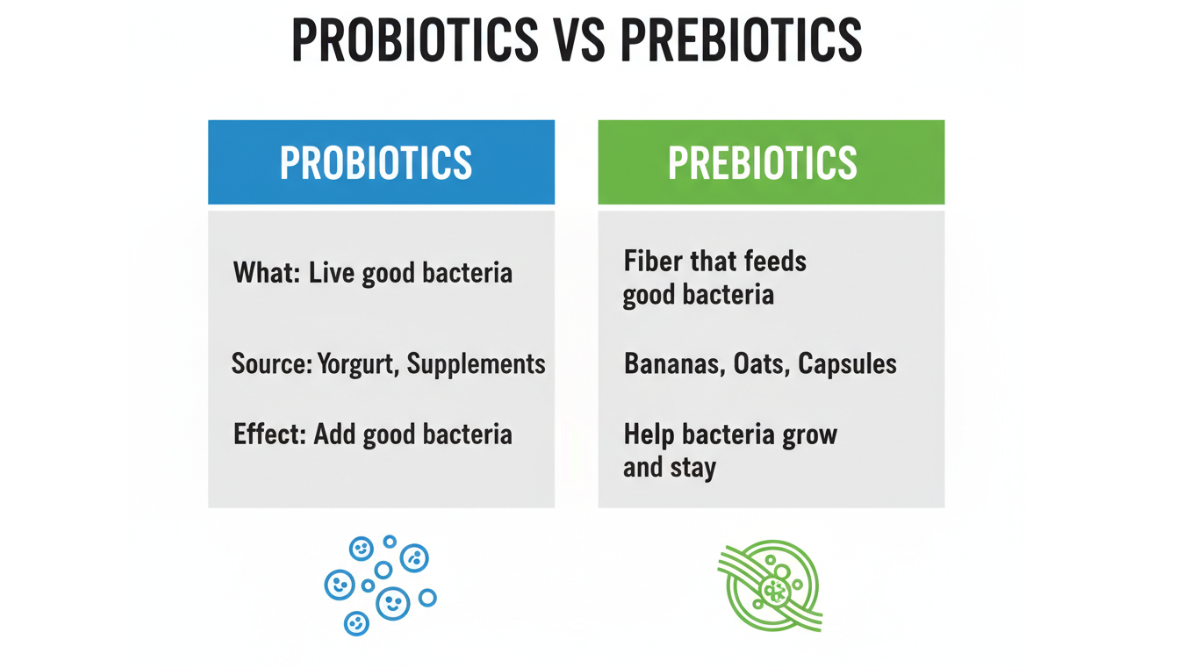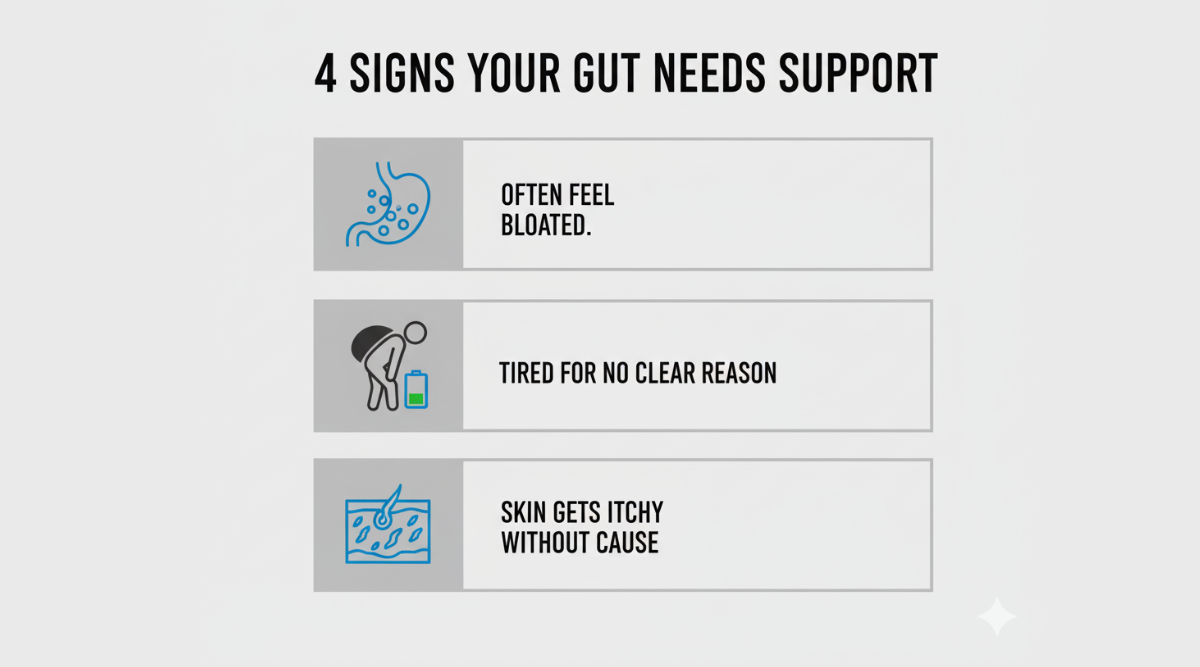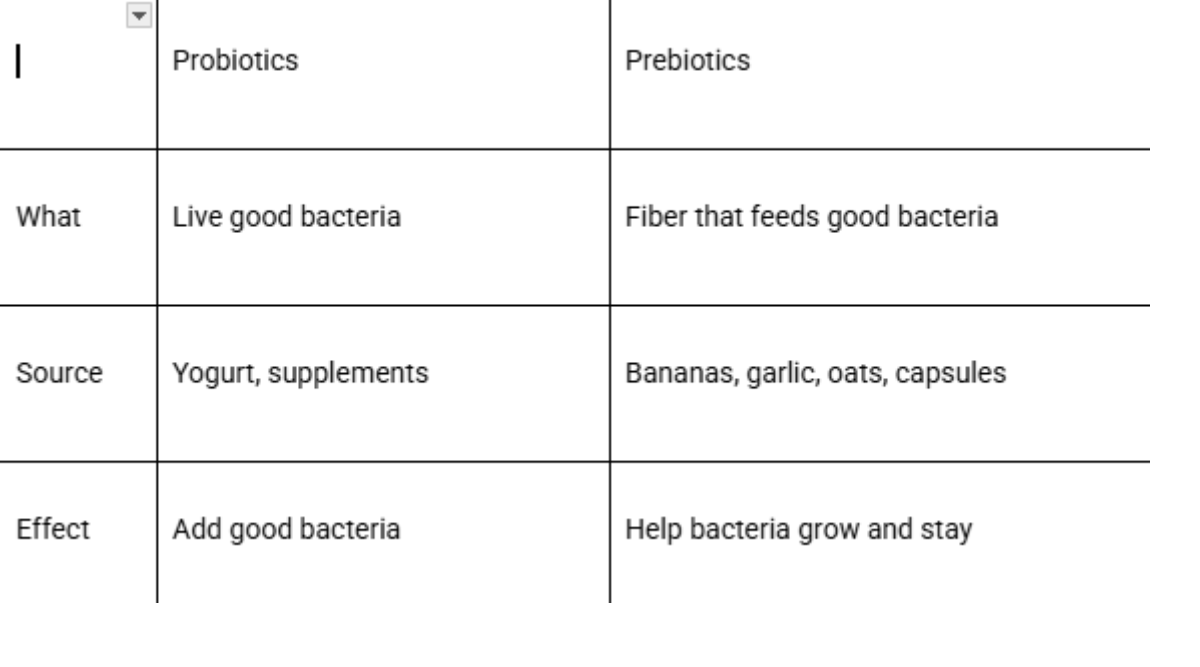Do you often feel heavy after a meal? Are you looking for ways to keep your gut happy each day? Knowing the difference between probiotics and prebiotics can make your gut stronger. When you help your gut work better, you help the rest of your body, too. This blog will show you the main facts about probiotics vs prebiotics for gut health. Here, you will learn how both can help, where to find them, and how to use them well. Dr. Morepen Home explains all you need to know - step by step.
Why Gut Health Depends on Both Probiotics & Prebiotics
The Gut Microbiome’s Role in Wellness
Your gut has many tiny living things inside. These are good bacteria. They help break down food and take up nutrients. When they work well, you feel energetic and healthy. If these bacteria become fewer or weak, your body may feel tired or unwell. Gut health also helps your immune system and can even affect your mood.
How Probiotics and Prebiotics Interact
Probiotics are live, helpful bacteria. Prebiotics are fibers that act like food for these bacteria. If you think of probiotics as seeds, prebiotics are the water and sunlight. Both must work together. This helps keep your gut balanced and healthy for a long time.

Signs Your Gut Needs Support
Sometimes your gut may feel upset. These are common warning signs:

- You often feel bloated
- Constipation or loose stools happen a lot
- You are tired for no clear reason
- Skin gets itchy without cause
When you have these problems often, it is worth checking with a health expert. They can guide you on which supplements or foods might help.
Real-World Impact: Research and Clinical Findings
Scientists have found that using probiotics or prebiotics can help people:
- Get regular motions
- Soothe stomach pain
- Boost body resistance
- Feel lighter after meals
Understanding Probiotics
What Probiotics Actually Do in the Gut
Probiotics add good bacteria back into your gut. These bacteria make it easier to digest your meal. They break down things your own body cannot. Probiotics also keep harmful bugs under control. When the balance is right, your whole gut works better.
Most Effective Probiotic Strains & Their Benefits
Different strains offer different results. You may see these in Dr. Morepen gut products or other supplements:
- Lactobacillus rhamnosus: Known for its help with bowel movement and mood.
- Bifidobacterium lactis: Common for better immunity and less belly ache.
- Saccharomyces boulardii: Useful for dealing with diarrhea.
It is always best to check the strain and match it to your health need.
Key Dietary Sources of Probiotics (Foods & Supplements)
You can find probiotics in foods and supplements. Some choices:
- Yogurt with live cultures (not flavored)
- Pickled veggies, like kimchi or sauerkraut
- Traditional Indian items like homemade curd or lassi
- Probiotic capsules and sachets from Dr. Morepen
When Are Probiotics Needed Most?
Probiotics help most when:
- You are recovering from an infection or antibiotics
- Stress upsets your stomach
- Eating patterns change and digestion slows
Side Effects and Who Should Be Cautious
Most people can use probiotics safely. A few may face mild stomach gas at the start. If you have a very weak defense system, ask your doctor before trying any new product.
Understanding Prebiotics
How Prebiotics Fuel Healthy Gut Bacteria
Prebiotics are fibers you cannot digest. Instead, they pass into your colon and feed the good bacteria there. When well-fed, these bacteria grow and keep your gut full of the right types.
Top Prebiotic Foods to Include in Daily Diet
You do not need fancy foods to get prebiotics. Try adding:
- Chopped onions or garlic to curries
- Bananas in your morning cereal
- Oats or barley in rotis or porridge
- Boiled lentils and chickpeas in salads
- Some supplements, like those from Dr. Morepen, mix these natural fibers with live cultures for a stronger effect.
Fiber Types and Their Prebiotic Value
Look for foods high in inulin or FOS (fructo-oligosaccharides). You also get prebiotic value from cooked and cooled rice or potatoes.
Dosage and Safety Considerations for Prebiotics
Most people need 20-40 grams of fiber daily. Go slow if you are new to fiber. Too much, too soon, could make your tummy gassy.
Prebiotics in Products: What to Look For
Read labels. Find words like "prebiotic fiber," "inulin," or "FOS." Trusted brands, like Dr. Morepen, show clear labeling and dosage.
Probiotics vs Prebiotics: Key Differences & Complementary Effects
Table: How Probiotics Differ from Prebiotics

Potential Interactions With Each Other
Probiotics and prebiotics both help. They do best when you take them together. Some choose combos, called synbiotic products.
Do You Need Both for Maximum Gut Health?
Having both helps many people. Probiotics add new bacteria. Prebiotics feed both old and new good bacteria. This can lead to better results over time.
Synergy: Combining Foods and Supplements Correctly
Combine foods. Eat curd with chopped banana. Try a Dr. Morepen sachet with both live bacteria and fiber. It’s easy to match your meals to your needs.
Common Misconceptions (Separating Facts from Myths)
Some believe:
- “Supplements are better than food.” That is not true. Real foods help more for daily needs. Supplements fill the gaps.
- "You only need one or the other." In truth, both work best together.
Sourcing Probiotics & Prebiotics: Food vs Supplements
Best Probiotic-Rich Foods (Indian & Western Options)
Eating probiotic foods is a great way to help your gut. In India, fresh curd and lassi are popular choices. These dairy items have live bacteria that strengthen your digestion. Other fermented foods, like dhokla or idli, also carry healthy microbes.
For those who want options from around the world, try yogurt with live cultures, soft cheeses, or fermented veggies such as kimchi and sauerkraut. Eating a variety of these foods gives you many kinds of beneficial bacteria.
Best Prebiotic-Rich Foods for Indian Diets
Prebiotics can be found in simple, everyday foods:
- Garlic used in rasam or tadka
- Red onions added to salads or chutneys
- Bananas, a quick snack or topping
- Boiled chickpeas in chaat or curries
- Oats cooked as porridge or upma
Fiber-rich food is at the heart of every Indian meal. Including more of these every week feeds the good bacteria already living in your gut.
Evaluating Supplements: What Science Says
Supplements offer a way to fill gaps when diet falls short or your gut needs extra help. Dr. Morepen products combine key probiotic strains with prebiotic fibers. These blends are easy to take and may offer faster comfort for bloating or irregular digestion.
Science suggests that supplements work best when used for targeted needs—like after antibiotics or during travel, when eating patterns change. Always check the strain and dose on the pack. Trusted brands disclose these clearly.
Label Reading Tips for Quality & Potency
Good supplements show clear ingredient lists. Look for:
- Names of probiotic strains (e.g., Lactobacillus, Bifidobacterium)
- Amount of live cultures or CFU (Colony Forming Units)
- Prebiotic types (e.g., inulin, FOS)
- Expiry dates
Read directions carefully to get the best results. Follow serving sizes as advised, and avoid going over the recommended dose.
When Supplements Are Advised (Who Benefits Most?)
Supplements may help if:
- You have poor appetite or limited food choices
- Recovery from stomach infections or antibiotics
- Older adults with slower digestion
- Kids, after a doctor’s advice
If you aren’t sure, ask a healthcare professional. They can help choose what’s right.
Usage Guidelines: When and How to Take Probiotics & Prebiotics
Age, Health Condition, & Dosage Advice
Every stage of life benefits from gut-friendly foods, but needs are different. Children usually do well with probiotic-rich yogurt or small doses in supplements. Adults might need higher fiber in meals. Seniors often need more support, as digestion slows. Stick to product guidelines and start slowly with any new supplement.
Morning vs Evening: Best Time to Take
Most experts suggest starting the day with prebiotic fiber, as breakfast is a good time for bananas or oats. Probiotics, whether in curd or a capsule, work well any time, but many choose evening to avoid stomach upset with medicines.
Timing Around Antibiotics/Medications
If you’re taking antibiotics, space your probiotic dose at least 2 hours apart from your medicine. This keeps the live bacteria strong and lets both work well.
Common Mistakes and Usage Myths
Some folks expect quick results right away. Gut repair takes time. Eat fiber or take supplements regularly for lasting comfort. Another mistake? Overdoing fiber on day one—this can cause gas. Build up slowly.
Tracking Gut Health Outcomes
Keep a simple food journal. Write how you feel after changes. Notice less bloating, easier mornings, or lighter energy.If symptoms persist, consult a doctor.
Case Studies: Probiotics and Prebiotics for Specific Needs
IBS, Constipation, and Diarrhea Relief
People with Irritable Bowel Syndrome (IBS) often find probiotics or prebiotic blends offer better regularity. Those who face constipation benefit from more fiber and live cultures especially after sickness.
Gut Health’s Impact on Immunity
A well-nourished gut sends strong signals to your immune system. Regular use of gut-friendly foods may lower your risk of infections and allergies.
Mental Well-Being and the Gut-Brain Axis
Research shows our gut talks to our brain. If your stomach is unhappy, you may feel anxious or blue. Balanced gut bacteria can help improve mood and focus.
Sports Performance & Recovery Implications
Athletes use probiotics to speed up recovery and support overall energy. Healthy digestion means nutrients get absorbed quicker, boosting stamina.
Children, Seniors, and Special Populations
Kids need gentle sources—usually yogurt or doctor-approved supplements. Seniors often feel more comfortable with easy-to-digest foods and carefully chosen capsules. Always tailor advice to age and health condition.
Frequently Asked Questions (FAQ)
Are there any risks or side effects?
Both are safe for most people. Start with small amounts—fiber can cause gas if you eat a lot suddenly. If you have a health condition, talk to your doctor.
How long until benefits are noticeable?
Some feel lighter in a week; others take longer. Long-term use gives lasting results.
Is it safe during pregnancy or for kids?
Most prebiotic foods are safe. Probiotic supplements should be checked with your doctor, especially for children or during pregnancy.
Which foods or supplements work quickest?
Yogurt and curd often help within days. Supplements may show comfort faster when the dosage fits your needs.
.png)


.png)
.png)
.png)
.png)
.png)
.png)
.png)
.png)
.png)
.png)
.png)
.png)
.png)
.png)
.png)
.png)
.png)
.png)
.png)
.png)
.png)
.png)
.png)
.png)
.png)
.png)
.png)
.png)
.png)
.png)
.png)


.png)
.png)
.png)
.png)
.png)
.png)
.png)

.png)
.png)
.png)

.png)
.png)
.png)
.png)
.png)
.png)

.png)
.png)

.png)
.png)
.png)

.png)

.png)


.png)







